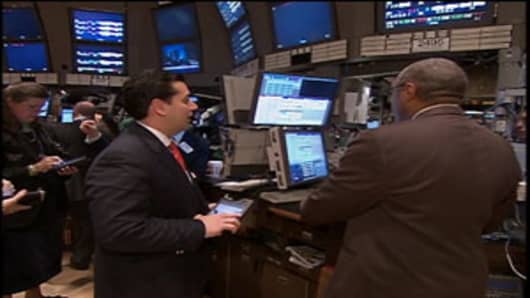Stocks dropped sharply last Tuesday, with the Dow plummeting to close down 226 points, in part due to continued weakness in the housing industry. The second sharp drop of the week came on Thursday when the Dow closed down 311 points, largely on concerns about corporate credit challenges. The major averages extended losses on Friday, despite better-than-expected gross domestic product data, as credit concerns continued to weigh on the markets.
Even in these volatile times, most analysts remain optimistic about the longer-term prospects for stocks. The latest CNBC Trillion Dollar Survey of analysts showed that none of them believe this is the beginning of a bear market and 46% of those surveyed view the selloff as a buying opportunity.
"This is very similar to me to what happened in February," said Michael Cuggino, portfolio manager at Permanent Portfolio Funds. "We still think the economy is going to continue to grow and stocks will continue to move higher."
Riding a Rollercoaster
Analysts may differ over when they think stocks will rebound, but virtually all of them agree that the volatility in the markets will continue for the next several weeks.
"It looks like we're on a big rollercoaster ride and trending lower short-term," Frederic Dickson, chief market strategist at D.A. Davidson, told CNBC.com. "I don't see this as a start of a 20% bear market, but I think 13,000 will be coming back into investors' thoughts. I think that we'll be trading in the 13,000 to 14,000 range for a couple of months."
"My expectations are that the volatility will continue to be high and that the markets will end the week flat to down," said Mike Malone, equity sales and trading analyst at Cowen & Company.
This week, traders will get more indications about the health of the U.S. housing market from construction spending and pending home sales data. The Institute for Supply Management will release its monthly reading on the manufacturing and services sectors. Perhaps, the most influential economic data will be released on Friday when the Labor Department delivers the employment data for July.
More companies will report earnings this week, although earnings season is beginning to wind down. Companies reporting include Dow components Verizon, General Motors, Disney and Proctor & Gamble.
Through July 27 about 300 of the S&P 500 companies have reported. The majority, 65% have beat earnings estimates, while only 18% have missed forecasts, according to Thomson Financial.
Despite the good earnings news, Malone believes corporate credit concerns will continue to overshadow the stock market. "First and foremost, you have to pay attention to what's taking place in the credit markets again," said Malone. "We are particularly looking to see if there are any other deals that are postponed or deals that have difficulty placing."
The Bright Side of Volatility
Some analysts see the current volatilty as an opportunity for investors to put new money to work in the right sectors.
"If you have a 6- or 12-month time horizon, the selloff is creating some very good opportunities and we would be buying into this to make money over the next year," said David Katz, chief investment officer at Matrix Asset Advisors.
Riley recommends the SPDR S&P 500 exchange-traded fund, which tracks the stocks in the S&P 500, and the Nasdaq-100 Index Tracking Stock , a portfolio of 100 stocks from a range of industries including computers, telecom, retail and biotechnology. "Let diversity prevail," said Riley. "I think people will do exceptionally well between now and the end of the year."
Ken Heebner, portfolio manager of the CGM Focus Fund, likes oil services giant Schlumberger . "This is a company that's growing 25-30% for the next several years, independent of what happens to the economy, selling at 17 times earnings," said Heebner. "It's a bargain."
"Sure you can wait and see if there's more room to fall, but stocks were not outrageously expensive before this," said Cuggino. So, if the market corrects, that makes them even more attractive. I would be looking for sectors that have corrected more than the broader market like financial services, REITs, some selective tech shares, pharmaceuticals and biotechnology."
Walter Todd, a money manager at Greenwood Capital, likes large caps with international exposure such as IBM , Pepsi and Colgate-Palmolive . "People are going to pay a premium for growth in the earnings because, in the overall market, earnings are slowing down," said Todd. "So you have to look at sectors that have exposure to the rest of the world. That's healthcare, consumer staples, some technology stocks and industrials as well."
Barry James, portfolio manager at James Advantage Funds, believes value stocks will probably hold up better if the market goes through a volatile period. "Right now, it's not a matter of how much can you make, it's how much can you keep. We'd look for companies that are buying back shares, where there's not huge expectations in terms of earnings."
Phyllis Burke Goffney is a news editor at CNBC.com. She can be reached at phyllis.goffney@nbcuni.com.


